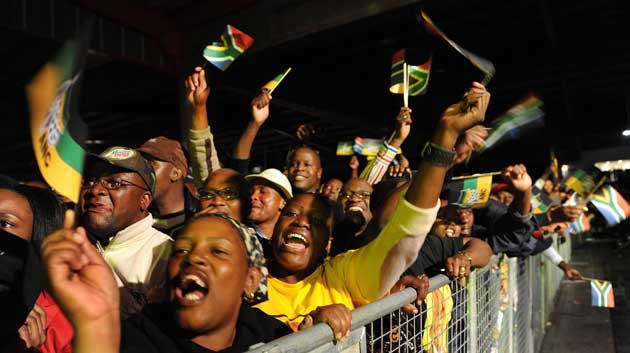ANC holds on to power but its share of vote is reduced
The party now faces the most serious challenge to its authority since it took control 15 years ago

South Africa's ruling ANC has won a huge victory in the country's election but fell short of the two-thirds of votes needed to ensure a parliamentary majority big enough to make sweeping constitutional changes unchallenged.
Official results from the election – which will see the African National Congress leader Jacob Zuma become President on 9 May – showed yesterday that the ruling party won 65.9 per cent of the vote.
The margin that would let the ANC change the constitution is largely symbolic. The party has repeatedly stressed that it has no intention of doing this.
However, Steven Friedman, a political analyst, said the result meant the ANC now had to worry more about the opposition than at any time since it took power 15 years ago. "The effect of them not getting the two-thirds, despite the euphoria, really underlines that there has been a drop in the ANC vote," he said.
Financial markets, wary of a policy shift to the left under a Zuma presidency, may welcome a limit on the party's power.
The Independent Electoral Commission released official results and said that the ANC would be allocated 264 seats in South Africa's 400-seat parliament after it won 11.65 million votes out of 17.68 million valid votes cast in Wednesday's election.
Although a newly formed party of ANC dissidents has failed to make a dramatic impact, the ruling party has seen its share of the vote fall for the first time since the end of apartheid in 1994. It won nearly 70 per cent in 2004.
The ANC also lost control of the Western Cape province, centre of the tourist industry, to the official opposition Democratic Alliance (DA), which is led by Helen Zille, a white woman.
But the ANC celebrated what was still an overwhelming victory under the leadership of Mr Zuma, who just three weeks ago succeeded in getting a court to drop corruption charges his supporters say were politically motivated. The party's credentials for ending white minority rule were more important for many voters than its doubtful record on fighting poverty, violent crime and Aids.
The ANC's closest rival was the DA, with 16.66 per cent of the vote. The Congress of the People (Cope), formed by politicians who broke from the ruling party, stood at 7.42 per cent. The DA will get 67 seats in parliament and Cope 30. Support for the Inkatha Freedom Party waned to 4.56 per cent, down from 6.97 per cent in 2004, giving it 18 seats. The ANC also made inroads into the IFP's traditional support base in KwaZulu-Natal province, home to South Africa's Zulus, the biggest tribal group, of which Mr Zuma is a member. Electoral officials said that the turnout was 77.3 per cent, a little higher than in 2004.
Mr Zuma's supporters have been celebrating since shortly after the voting ended on Wednesday, as his party's victory had not been seriously in doubt. The ANC views Mr Zuma as the first leader who can energise voters since Nelson Mandela. But others say he is too beholden to unions and left-wingers.
At the end of the campaign, Mr Zuma was talking not about creating jobs, but staving off job losses. His personal charisma and rise from poverty to political prominence have drawn adoring crowds throughout the election campaign, although critics question whether he can implement his populist agenda amid the global economic meltdown.
Join our commenting forum
Join thought-provoking conversations, follow other Independent readers and see their replies
Comments
Bookmark popover
Removed from bookmarks